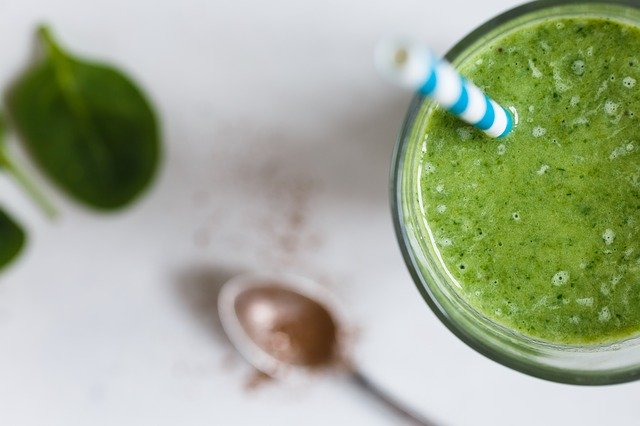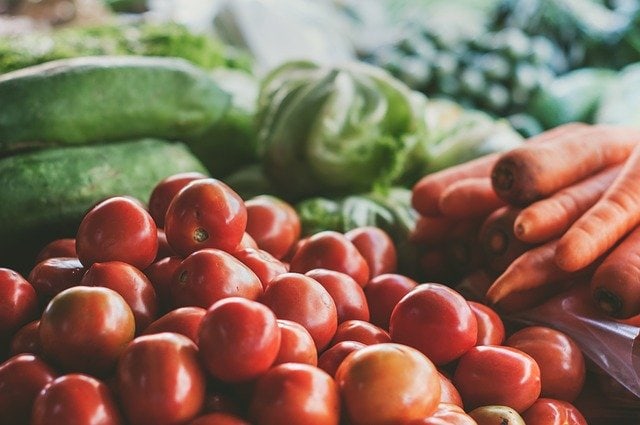Did you know that alkaline foods are super good for you? Or that eating an alkaline diet can boost your energy, accelerate healing and help banish certain diseases?
It’s true!
But, if you’re wondering ‘what is an alkaline diet?’ and feeling like you need an Alkaline Diet For Beginners guidebook, you can relax. You’re in the right place to find the answers you need, so let’s jump straight into the wonderful world of alkaline foods.
What is an alkaline diet?
To understand the alkaline diet, you first need to recognise the importance of pH.
pH (or potential hydrogen) refers to the acid or alkaline environment of something. While this sounds complicated, you’ve probably heard about pH if you have a backyard swimming pool. You know those coloured test strips that you insert into the pool’s water every week or so? They test the pool’s pH and indicate whether its environment is slightly alkaline and healthy, or more acidic and conducive to harbouring bacteria and other pathogens.
Your body is kind of the same. It also needs to maintain acid/alkaline balance for optimum health. Ideally, your body’s blood pH is slightly alkaline at 7.35 – 7.45. Unfortunately, modern diets are often full of acidic foods, which can cause a build-up of detrimental acids in your body.
An alkaline diet prescribes more alkaline foods to prevent the build-up of acid in your body and works to support and gently detox your system.

What are alkaline and acidic foods?
Every food has its own pH level, ranging from 1 (highly acidic) to 11 (highly alkaline). When you eat, food is digested by the body and leaves behind an alkaline or acidic residue.
This can get complicated, as some foods that are technically alkaline leave behind an acidic residue, and vice versa. For example, lemons are highly acidic but have a post-digestive alkaline effect.
Are acid foods bad for the body?
Acid isn’t bad for the body, per se. In fact, some organs, like your stomach, require a high level of acidity in order to function properly. But, if you eat too many acidic food, your body builds up acidic wastes that can lead to a variety of health conditions.
An acidic body has poor gut health, is vulnerable to joint pain, weight gain, and mental or physical fatigue. As acids build up, they damage the organs and lay the foundation for chronic diseases, including osteoporosis, autoimmune disorders and even cancer. It also forces the body to draw on important resources to buffer pH levels, weakening the systems and leading to inflammation.
What are alkaline body benefits?

When you eat alkaline foods as part of an alkaline diet, you can expect improved energy, a happier immune system, and a whole range of other health benefits.
Conversely,the more acidic foods you eat, the higher the level of acidity in your blood. The higher your acidity, the worse the body fares as it becomes prone to more and more inflammation. Fortunately, this state of acidosis can be buffered, to some extent, using alkalising foods to help the body stay in its preferred mild alkalinity state.
A study by the Journal of Environmental and Public Health showed that eating food with a higher alkaline quality has definite health benefits, including:
- Stronger immune system
- Decreased chance of developing chronic diseases and inflammatory conditions
- Balanced hormone levels
- Prevention of gallbladder and kidney stones
- Lowered body fat and weight, along with improved muscle mass
- Higher energy levels
- Reduced cancer risk
- Improved cognition, perception and mood
Understanding the metabolism definition and knowing how your diet impacts your health is important for your wellbeing. Spend some time observing how a more alkaline diet makes you feel, so you can track small and large improvements.
What should I eat to maintain healthy alkaline levels?
When you follow an alkaline diet, you consume a balance of 70% alkaline foods and 30% acidic foods. The trickiest part of this can be restricting acid-producing foods as they’ve become an extremely common (and overused) part of modern diets. Foods to minimise include:
- Meat and fish
- Eggs and dairy
- Bread and many other grain-based foods
- Alcoholic, soft drinks, caffeinated beverages
- Processed foods with additives, sugar and preservatives. Learn how anyone can quit sugar for better health.
- High protein supplements
Top 10 alkaline foods to include in your diet
-
Leafy green vegetables
-
Garlic, Onion and Ginger
-
Root vegetables, especially beetroot and carrots
-
Pumpkin
-
Mango
-
Papaya
-
Apples
-
Hazelnuts
-
Quinoa
-
Parsley

Is it dangerous to follow an alkaline diet?
High alkaline foods, as part of an alkaline diet, are beneficial – provided a healthy balance of food choices is maintained.
There are some parties who argue against this diet, saying that no food can alter the pH of the blood and that the body has its own systems for maintaining desired pH. If a balanced diet isn’t followed, then eating a diet of mostly alkaline foods can lead to a condition called metabolic alkalosis, which brings on symptoms like vomiting, headaches, tremors and nausea. While this is possible, it is rare. Following the guidelines in this article will help ensure the benefits of alkaline in the body are supporting your body and mind.
The pros and cons of an alkaline diet
As you already know, there is some debate around the alkaline diet. This is mainly because many of the diseases or conditions that an alkaline diet is said to prevent or cure, have a number of causes. Therefore, using an alkaline diet as sole treatment is not the best way forward.
In addition, alkaline diets call for restrictions on many important food groups, such as dairy and certain grains, which some people believe could contribute to nutrient deficiencies. Essentially, they are concerned that it’s not a balanced diet, and that any diet which doesn’t strike a balance between all of the food groups cannot be healthy.
While alkaline diet benefits may be debated, this way of eating focuses on the basics of healthy eating, whether it’s the best plant based diet or a more inclusive diet:
- Increasing vegetarian meals
- Eliminating excess sugar
- Reducing processed foods and bad fat
- Eating more vegetables and fruit
- Adding legumes, nuts and seeds to the diet.
All of the above would be considered good habits by any medical professional and can safely be implemented by anyone.
How do you know if your body is more acidic or alkaline?
The best way to know if your body is more acidic or alkaline is to do a urine test using pH strips. It’s best to do this test in the morning before you eat or drink, as this will give you the most accurate results.
If your results are lower than 6.5 you’re acidic.
If your results are above 7.5, you are considered alkaline.

NB: If you have existing health conditions or are taking prescription medication, your reading may be slightly altered and you best check with your doctor if an alkaline diet is suitable for you. You may also want to consult a nutritionist online to find a diet plan that suits your health conditions.
Symptoms of high acidity in the body
You don’t always have to do the tests to know your body is acidic. If you are alert to what your body tells you (hello intuition!), you notice the signs. When your pH level drops to below 6.5, you may notice the following early symptoms:
- Fatigue and lethargy
- Skin problems, e.g. acne or dull skin
- Weight problems
- Looking ‘old’ and tired
If you don’t start following an alkaline diet at this stage to balance your pH levels, you might experience more advanced symptoms like:
- Frequent headaches
- Digestive trouble, e.g. diarrhoea or nausea
- Constant cough
- Shortness of breath
- Vulnerability to coughs and colds
- Frequent UTIs or yeast infections
Easy ways to adopt a more alkaline diet
It can be confusing to know where to start, but if an alkaline diet is calling you here are some easy hacks.
Add more greens to your diet. Whether you like spinach, cabbage, lettuce, kale, or broccoli, start using greens more frequently in your diet. It helps to always have some on hand to steam and add to your plate. You can always toss a salad for dinner or add some leaves in your sandwiches, but you can also stuff your greens into a glass by drinking a green smoothie in the morning.

Eat less meat, fish and eggs and plan meals around plant-based proteins and meat substitutes. A good ratio is to eat vegetarian or vegan meals during the week, and enjoy a non-vegetarian meal or two on the weekend.
Avoid processed foods like instant noodles, biscuits, chips or canned fruit juices. Instead, replace them with healthier options like veggie sticks with dips, baked or sundried chips made from veggies and homemade shakes.
Choose your sweet treats carefully. If you have a sweet tooth, it’s hard to give up that scoop of ice-cream at night or that cinnamon roll you enjoy with your coffee. But, sugary foods significantly contribute to acid levels in your body, so it’s important to find ways to reduce the amount of sugar in your diet. You can also try allowing yourself a treat that you really enjoy, then find the willpower to cut out the rest.
Choose homemade. A good way to reduce sugar in your diet is to eat or drink more homemade food and beverages. Canned, pre-packed and store-bought items are usually filled with all kinds of sugar, even if you can’t taste the sweetness. Making your own biscuits at home gives you more control over what goes in them.
Eat more citrus fruit. Just because lemons or oranges taste sour, it doesn’t mean they contribute to acid levels in your body. You can add sweet limes or oranges to your salads or make a refreshing juice using infused water to sip on during the day. You might also like to use lemon juice as a natural flavour enhancer for roasts, bakes, salads and beverages.

Many Aussies aren’t getting their recommended daily intake of fruit and vegetables. Modern diets are part of the problem, as they’re brimming with over-processed and pre-packaged foods that give us a false sense of nutrient intake. It’s been said that over 42% of our recommended calorie requirement is met by processed food – and this is a recipe for disaster. Following any version of a better diet, including an alkaline diet that’s rich in alkaline foods, will most likely lead to better health.
Ask yourself, do I need to find a dietician near me or get a consultant to plan my diet?
If you have existing health concerns or are confused about which diet plan is right for you, it’s best to rely on the advice of your Doctor or a Nutrition expert. If you’d like to consult a Nutritionist, Avaana can help you find one.



